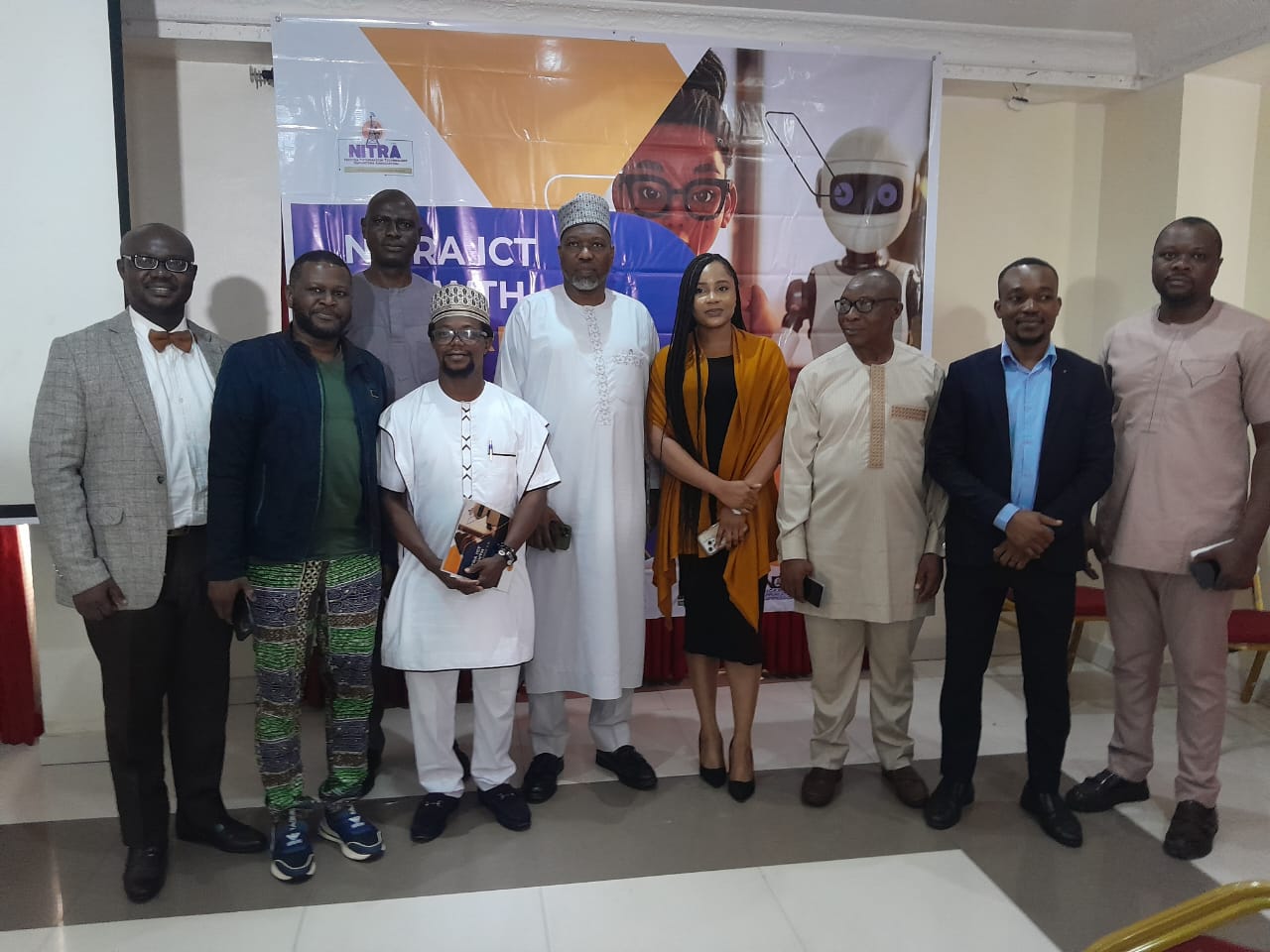General News
ICT Stakeholders Highlight Need for Sectoral Collaboration to Harness Benefits of AI

Mr. Adesola Akinsanya, President of the Nigeria Internet Registration Association (NiRA) and other stakeholders in the Information and Communication Technology (ICT) sector have underscored the need for collaborative efforts by opinion moulders in the sector to harness the benefits of Artificial Intelligence (AI) for economic growth.

A cross section of participants at NITRA ICT Growth Conference 4.0 with the theme: “Impact of AI on National Development: Prospects, Policies, and Challenges in Nigeria” held on Wednesday, August 28, 2024 at CitiHeight Hotel, Ikeja, Lagos.
The stakeholders stated this at the NITRA ICT Growth Conference 4.0 with the theme: “Impact of AI on National Development: Prospects, Policies, and Challenges in Nigeria” held on Wednesday, August 28, 2024 at CitiHeight Hotel, Ikeja, Lagos.
Speaking at the event, Mr. Akinsanya who was represented by Peter Oluka, member, Executive Board of Directors, NiRA emphasized that AI has the potential to drive economic growth, improve businesses and public services, as well as enhance the quality of life in Nigeria.
He hinted that realizing these benefits requires careful consideration of the prospects, the formulation of sound policies, and addressing the accompanying challenges.
According to him, “As AI continues to evolve, it’s potential to drive economic growth and improve businesses and public services, and also enhance the quality of life in Nigeria is immense”.
Adding that the complex challenges associated with AI cannot be solved by any single entity rather it requires partnerships, shared knowledge, and collective action that can drive the kind of growth that is inclusive, sustainable, and transformative.
Prof. Obadare Peter Adewale, Founder and chief visionary officer, CVO, Digital Encode, emphasized the need for Nigeria to understand the threat landscape and the critical role of cybersecurity in protecting against these threats.
Prof. Obadare represented by Mr. Oluwakayode O. Olatunji, CISO and Group Head of InfoSec & GRC Advisory, Digital Encode, underscored the importance of driving sub-sectoral digital growth through Artificial Intelligence (AI) while also decrying that many African countries lag behind in cybersecurity.
He further highlighted the potential of AI across various sectors, including finance, health, energy, transportation, defense, medical, and agriculture.
He underscored AI’s ability to predict productivity and its diverse benefits but quickly cautioned against the dangers of AI misuse, stemming from issues such as bias and fairness, security vulnerabilities, data privacy concerns, and ethical and moral dilemmas.
The cybersecurity expert discussed the use of AI in threat landscape profiling, crime detection and prevention, and reporting capabilities.
He stressed the importance of responsible AI usage and the need for continued investment in AI and cybersecurity.
Earlier, Mr. Chike Onwuegbuchi, Chairman, Nigeria Information Technology Reporters Association (NITRA) was displeased with the abysmally low adaptation trend by Nigerians to new technologies.
He urged stakeholders in the sector to lay more emphasizes on technology adaptation, adding that the country is number one in the usage of internet in Africa but lags in connectivity and internet penetration.
According to him, “There has been a known trend in Nigerians’ adaptation of new technology, where usage is higher than implementation.
“For instance, we are number one in the usage of internet in Africa but lags in connectivity and internet penetration.
“Artificial Intelligence has followed the same trend, Google search trends reported recently that searches for artificial intelligence (AI) have continued to rise around the world, with Nigeria experiencing a 130% increase in 2024.
He called on relevant ICT stakeholders in the sector to collaborate with government agencies to fashion out / design a curriculum for school to ensure that the study of AI is included in secondary schools.
He also warned that we should avoid the ugly trend / situation where for instance most students of computer science in our higher institutions do not have the opportunity to have a hands-on experience with a physical Computer throughout their duration in school.
Dr. Oluseyi Akindeinde, founder of Hyperspace and NeuRal AI, highlighted AI’s challenges and opportunities, reassuring that AI will enhance human capabilities, not replace them.
He showcased AI applications in transcription, translation, and education, demonstrating its potential to drive innovation and inclusive development.
A panel discussion composed of representatives from the NCC, private sector, and media and moderated by Mr. Hillary Damissah, explored how to navigate AI’s dangers in a developing economy.
They emphasized the need for policy frameworks, regulation, and collaboration to mitigate AI’s negative effects and ensure its benefits are equitably distributed.
The conference underscored AI’s significance in Nigeria’s development, urging stakeholders to work together to create an environment conducive to innovation, research, and tech adoption.
As AI continues to evolve, Nigeria must prioritize strategic planning, ethical considerations, and inclusive growth to harness its full potential.
General News
IHS Nigeria, United Nations Global Compact Host High-Level Dialogue on Sustainability and Greener Business Practices in Nigeria

IHS Nigeria, in collaboration with the United Nations Global Compact Network Nigeria, hosted a high-level private sector dialogue themed “Collaborative Strategies for Greener Business Practices, Innovation and Sustainable Development”.

The event, held in Lagos, brought together key players from different sectors including finance, law, telecommunications, biodiversity, and corporate sustainability to explore actionable pathways to achieve meaningful environmental stewardship in Nigeria.
The panel session offered bold perspectives on integrating sustainability into business frameworks across different sectors, whilst dispelling myths, and highlighting opportunities for organizations, and calling for collective action from all players within the business value chain.
Delivering a keynote address, Titilope Oguntuga, Director, Sustainability at IHS Nigeria, emphasized the urgency of environmental consciousness: “Sustainability is not a destination — it’s a collective journey.
“It requires courage to transform, vision to lead, and collaboration to scale. Nigeria stands at a crossroads. We can either be overwhelmed by the risks or rise to become a beacon of green innovation and inclusive growth in Africa. The choice is ours — and the time is now.”
Sylvie Josel, Lead, Biodiversity and Nature-Based Solutions at the United Nations Global Compact, joined virtually from New York and spotlighted nature as a strategic asset:
“Nature must no longer be treated as an afterthought. It underpins everything, from human rights to supply chains. Embedding biodiversity into a company’s core strategy isn’t just a risk mitigation measure; it’s a smart, future-forward business imperative”.
Lanre Babalola, Group Head, Climate Finance and Sustainability at the Bank of Industry (BOI), provided insights into how BOI is funding sustainable ventures and driving innovation: “We look beyond profitability; we look at environmental and social impact. Whether it’s plastic roads, biogas, or solar transitions, we support businesses that are not only bankable but capable of reshaping the future.”
From the legal perspective, Oyeronke Oyetunde, General Manager, Regulatory Affairs, MTN Group, drew attention to the regulatory challenges hindering sustainability adoption: “Our legal frameworks are trailing behind today’s sustainability realities. We need forward-thinking laws, reduced regulatory silos, and incentives that reward the right behavior. Sustainability can’t thrive where enforcement is weak, and taxation is excessive.”
Abimbola Agbejule, Head, Corporate Sustainability and Responsibility at Wema bank, spoke passionately about inclusiveness in sustainable development: “You don’t need to start big to make impact. MSMEs make up a huge part of our economy. Sustainability should be embedded in their day-to-day activities, and we must democratize access to knowledge, tools, and partnerships.”
The session was moderated by Gloria Okorie, Head of Programs at the United Nations Global Impact Center.
The event closed with a resounding call to action for stronger legal frameworks, deeper collaborations, and inclusive capacity building across sectors. The event further reinforces IHS Nigeria’s position as a leader in corporate sustainability and innovation in Nigeria.
“At IHS Nigeria, we recognize that true progress happens when sustainability is not an obligation, but a culture, lived every day, across every unit,” Titilope Oguntuga added.
Through initiatives like this dialogue, IHS Nigeria and its partners continue to champion solutions that protect the planet, empower people, and ensure long-term business viability.
General News
Bridging the Digital Divide: Over 700 Young Africans Empowered by Paradigm Initiative

Paradigm Initiative (PIN), a leading digital rights and inclusion nonprofit, has revealed in its 2024 Annual Impact Report that over 707 young individuals across 11 African countries have been empowered through its flagship LIFE Legacy Programme.

The initiative delivers training in life skills, ICT, financial literacy, and entrepreneurship—transforming underserved communities across the continent.
In 2024, the LIFE Legacy Programme ran 25 training cohorts across Cameroon, DRC, Ghana, Kenya, Senegal, South Sudan, Liberia, Uganda, Tanzania, Zambia, and Zimbabwe. In Senegal, 60 laptops were distributed to local partners, while digital literacy programmes were launched in schools in Cameroon and Tanzania through the LIFE@School initiative.
PIN advanced its advocacy by supporting 29 legal cases in Ghana, Kenya, and Nigeria. A notable success was the landmark judgment in Molehin v. UBA, where the bank was found guilty of violating data privacy laws.
PIN’s research and media efforts made powerful waves. The Londa digital rights report, covering 26 countries, was downloaded 8,457 times. Its fourth short film, Undersight, recorded nearly one million views on YouTube. PIN also developed an AI strategy report with TrustLaw and collaborated with the Centre for Democratic Technology to assess content moderation policies for Kiswahili across Kenya and Tanzania. A separate report highlighted the troubling deployment of surveillance technologies across Africa, which was referenced in direct advocacy engagements with a telecom operator.
The organisation’s advocacy also contributed to the adoption of the African Commission’s Resolution 580, which urges governments to avoid Internet shutdowns during elections—strengthening digital freedom across the continent.
Meanwhile, the Digital Rights and Inclusion Forum (DRIF) convened in Accra attracted 1,004 delegates from 61 countries, strengthening regional collaboration and amplifying the voice of civil society. PIN’s strategic communications pushed its media reach to 1.43 billion and social media engagement to 8.8 million.
Alongside training and policy efforts, the organisation inspired young changemakers through youth-focused campaigns and hosted seven fellows under the Digital Rights and Inclusion Learning Lab (DRILL) fellowship.
Crowning a year of impact, PIN earned the maiden PrivCon Privacy Award in Nigeria and was recognised in the Social Innovation Category at the Nigeria Innovation Awards for its work connecting African youth to digital opportunity.
General News
PalmPay’s Bold Move For Social Impact in Northern Nigeria

In the busy Fagge Market in Kano, Zahra Bello, a middle-aged entrepreneur who runs a fabric store, speaks about her experience with mobile banking and how this has simplified business transactions and improved her small business.

Behind the growth of these resilient women entrepreneurs lies a story of transformation powered by technology.
“My name is Zahra Bello, I’m from Dambatta in Kano State, and I’m a fabric trader. I first heard about PalmPay from my elder brother in March 2024. He told me how he used the PalmPay Target Savings feature to buy new machinery for his farm and even earned interest. That inspired me to try it too.”
Zahra downloaded the PalmPay app that very day. By December, she’d used the Target Savings plan to restock her shop with new fabrics, an achievement she never thought possible within such a short period. “I was so happy,” she smiles. “The interest I earned on my savings motivated me to save more. PalmPay has become my savings box. I use it for all my transactions now.”
Her story, like many others, is the inspiration for PalmPay’s evolving vision of inclusive banking in Nigeria’s underserved communities.
Women, SMEs, and Technology
Financial exclusion remains a critical challenge in Northern Nigeria. According to EFInA’s 2023 Access to Financial Services survey, an estimated 28.8 million adults in the North are excluded from the formal financial system, with exclusion rates as high as 47% in the Northwest.
Among women, especially those in rural areas, the figures are even more concerning, as these numbers represent the daily reality of millions of women who run informal businesses and contribute to household income without access to banking, credit, or digital tools.
PalmPay’s initiative addresses this gap directly. 5,000 female entrepreneurs in Kano and Kaduna will receive hands-on financial literacy training on mobile payments and their shops are rebranded with signages, aprons, and other kits that will enhance visibility for their businesses.
“I used to write down every sale in a notebook. Now I track everything with my PalmPay account,” says Rabi Abdullahi, a trader in Kano. “Customers trust me more now that I have a business name and branded store.”
PalmPay has done its due diligence to understand the challenges and has offered a tailored approach to solving these issues which includes this social impact initiative.
Social Impact and Strategic Growth
With over 35 million users in Nigeria, the company is keen to expand in regions where smartphone adoption is rising but digital finance penetration remains low.
Femi Hanson, Head of Marketing and Communications, explains: “We see this as long-term ecosystem building. When you give small business owners the tools to grow, you don’t just gain users, you build loyalty, trust, and sustainable impact.” This also aligns with Nigeria’s Financial Inclusion Strategy goal to reach 95% inclusion by 2025, a benchmark that can’t be reached without focused efforts in the North.
The project has earned the support of traditional leaders, most notably His Royal Highness, the Emir of Kano, Dr. Muhammadu Sanusi II, who praised the initiative and called for greater collaboration between the private sector and community stakeholders.
With the success of this initiative, PalmPay has continued to expand its solutions in these regions offering support to even more women.
In Northern Nigeria, where the need is great and the gap wide, PalmPay is proving that true impact goes beyond offering products to providing support and meeting the needs of its users at the grassroots.

 Telecom2 days ago
Telecom2 days agoALTON Clarifies on Migration to End-User Billing for USSD Services

 E-Financial2 days ago
E-Financial2 days agoNigerian Stock Market Suffers ₦183 Billion Loss Amid Profit-Taking

 News2 days ago
News2 days agoDStv Rewards Loyal Customers with Free Package Upgrades

 Telecom2 days ago
Telecom2 days agoLagos Future Conference 2025: Stakeholders Call for Digital Responsibility and Grassroots Innovation

 General News2 days ago
General News2 days agoAfrican Parliamentarians Seek Answers from Telcos on Quality of Service

 News1 day ago
News1 day agoLasaco Assurance to Invest in Technologies, Systems to Deliver Value to Clients

 E-Financial2 days ago
E-Financial2 days agoSEC Working on Stablecoin Regulation Framework

 News2 days ago
News2 days agoFCCPC Orders Air Peace to Appear Over Alleged Refund Violations




























